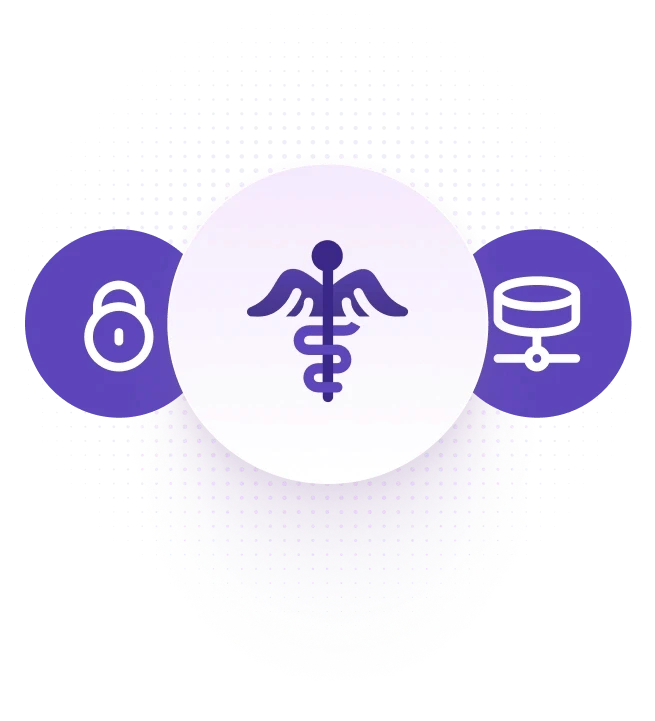Background and Importance of HIPAA Compliance
HIPAA, enacted in 1996, sets national standards for the privacy and security of PHI. It applies to healthcare providers, insurers, clearinghouses, and their business associates. The act is designed to protect individuals' medical records and other personal health information, ensuring that PHI is handled with the utmost confidentiality and security.
Who Needs HIPAA Compliance?
HIPAA compliance is mandatory for covered entities, including healthcare providers, health plans, healthcare clearinghouses, and any business associates that handle PHI. Compliance is also crucial for vendors and subcontractors who deal with PHI indirectly. Key protections under HIPAA include:
Protected Health Information (PHI): HIPAA safeguards any individually identifiable health information that is transmitted or maintained in any form, whether electronic, paper, or oral. PHI includes medical histories, test results, insurance information, and any other data that relates to a patient’s physical or mental health, healthcare services, or payment for those services. This protection ensures that sensitive health information remains confidential and secure.
Security Rule: The HIPAA Security Rule focuses on safeguarding electronic PHI (ePHI). It requires covered entities and business associates to implement administrative, physical, and technical safeguards to ensure the confidentiality, integrity, and availability of ePHI. This includes measures such as access controls, encryption, audit controls, and secure communication channels to prevent unauthorized access or breaches.
Minimum Necessary Standard: HIPAA requires covered entities to make reasonable efforts to ensure that only the minimum necessary PHI is used, disclosed, or requested to accomplish the intended purpose. This standard applies to all uses and disclosures of PHI, except for treatment purposes, to minimize unnecessary exposure of sensitive health information.
Business Associate Agreements (BAAs): Covered entities must enter into Business Associate Agreements (BAAs) with any third-party vendors or subcontractors that may have access to PHI. These agreements outline the responsibilities of the business associates to protect PHI and comply with HIPAA requirements. BAAs are essential for ensuring that all parties involved in handling PHI understand their obligations and the importance of maintaining data privacy and security.
Patient Rights and Control Over Information: HIPAA grants patients significant rights regarding their health information. Patients have the right to access and obtain a copy of their health records, request corrections to their records, and request restrictions on certain uses or disclosures of their PHI. They also have the right to receive confidential communications through their preferred means and to file complaints if they believe their privacy rights have been violated.
Why Do You Need HIPAA Compliance?
Legal Obligation: Compliance with HIPAA is a legal requirement to avoid hefty fines and legal penalties due to non-compliance.Protect Patient Information: Ensuring the privacy and security of patient information builds trust and maintains the integrity of healthcare services.Avoid Financial Penalties: Failure to comply can result in significant financial penalties, which can be devastating for any organization.
How Walturn Achieves HIPAA Compliance
Data Encryption: We employ state-of-the-art encryption methods for data in transit and at rest, ensuring that sensitive health information (PHI) remains secure and inaccessible to unauthorized parties. This includes the use of Advanced Encryption Standard (AES) protocols and Secure Socket Layer (SSL)/Transport Layer Security (TLS) for all communications.
Effective Incident Response and Breach Notification: We have an established process for responding to data breaches, including prompt notification to affected individuals and authorities as required by HIPAA.
Comprehensive Risk Assessments: We conduct thorough risk assessments to identify and address vulnerabilities in the handling of PHI.
Robust Privacy and Security Measures: Robust access control mechanisms are implemented to ensure that only authorized personnel have access to PHI. This includes role-based access controls (RBAC), multi-factor authentication (MFA), and stringent user authentication processes to prevent unauthorized access.
Audit Trails and Monitoring: We maintain comprehensive audit trails to log and monitor all access and modifications to PHI. This ensures transparency and accountability, allowing us to detect and respond to any unauthorized access or anomalies promptly.
Business Associate Agreements (BAAs): We establish comprehensive Business Associate Agreements with all third-party vendors and partners who may have access to PHI. These agreements mandate that our partners also adhere to HIPAA standards, ensuring a consistent level of data protection across all collaborations.
Regular Training and Awareness Programs: We ensure that all employees are trained and aware of HIPAA regulations and their responsibilities toward protecting patient information.






































